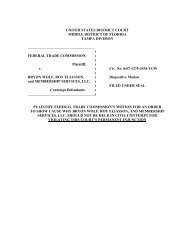Complaint Counsel's Post Trial Brief - Federal Trade Commission
Complaint Counsel's Post Trial Brief - Federal Trade Commission
Complaint Counsel's Post Trial Brief - Federal Trade Commission
Create successful ePaper yourself
Turn your PDF publications into a flip-book with our unique Google optimized e-Paper software.
44145, at *77 (N.D. Ga. June 4,2008) (granting the FTC's motion for sumar judgment and<br />
finding that since all of defendants' "claims regard the safety and effcacy of dietar<br />
supplements; () they must be substantiated with competent and reliable scientific evidence");<br />
Natural Solution, 2007 U.S. Dist. LEXIS 60783, at *11-13 (granting the FTC's motion for<br />
sumar judgment and applyig the "competent and reliable scientific evidence" standard to<br />
defendants' claims that their product prevents and treats cancer); FTC v. QT, Inc., 448 F. Supp.<br />
at 961 ("Reasonable basis" required defendants to have "competent and reliable scientific<br />
evidence" when they made the claim that the Q-Ray bracelet provides imediate, signficant, or<br />
complete pain relief).<br />
"Competent and reliable scientific evidence" is tyically defied as ''tests, analyses,<br />
research, studies, or other evidence based on the experise of professionals in the relevant area,<br />
that has been conducted and evaluated in an objective maner by persons qualified to do so,<br />
using procedures generally accepted in the profession to yield accurate and reliable results."<br />
See, e.g., Brake Guard Products, Inc., 125 F.T.C. 138 (1998); ABS Tech Sciences, Inc., 126<br />
F.T.C. 229 (1998).<br />
Cours have consistently found or upheld that double-blind, placebo-controlled studies<br />
are required to provide adequate substantiation for the trthfulness of varous health-related<br />
effcacy claims. See, e.g., FTC v. SlimAmerica, Inc., 77 F.Supp. 2d 1263, 1274 (S.D. Fla. 1999)<br />
("Scientific validation of<br />
combination of<br />
the defendants' product clais requires a double blind study of the<br />
ingredients used in (the product formula)."); Sabal, 32 F.Supp. 2d at 1008-09<br />
(rejecting study as valid substantiation, in par, because it was not blinded or placebo-<br />
controlled); FTC v. Cal. Pac. Research, Inc., 1991 U.S. Dist. LEXIS 12967, at *12-13 (D. Nev.<br />
Aug. 27, 1991) (only placebo-controlled, double-blind clinical studies meet ''the most basic and<br />
22

















